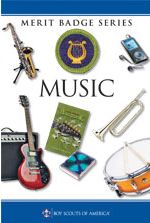A revised merit badge pamphlet which merged Bugling
into Music (shown above), and with revised requirements, as shown below, was released in
early 2010.
The revised requirements weren’t to become official until the 2011 Boy Scout Requirements book
was released
in January 2011.
However, in August 2010, BSA reversed their decision to discontinue
Bugling as a separate Merit Badge.
A replacement pamphlet, retaining both badges was subsequently released to
replace it.
The 2011 Boy Scout Requirements book included the previous requirements, with none of the changes shown below.
We assume that, if Scouts have a copy of the merit badge pamphlet
with Music only,
they could choose to earn the Music merit badge using the
requirements as listed in the pamphlet and shown below,
including the new bugling option,
or they could earn Music merit badge using the previous requirements.
- Sing or play a simple song or hymn chosen by your counselor using good technique, phrasing, tone, rhythm, and dynamics.. Read all the signs and terms of the score.
- Name the five general groups of musical instruments. Create an illustration that shows how tones are generated and how instruments produce sound.
- Do TWO ONE of
the following:
- Attend a live performance, or listen to three hours of recordings from any two of the following musical styles: blues, jazz, classical, country, bluegrass, ethnic, gospel, musical theater, opera. Describe the sound of the music and the instruments used. Identify the composers or songwriters, the performers, and the titles of the pieces you heard. If it was a live performance, describe the setting and the reaction of the audience. Discuss your thoughts about the music.
- Interview your parents and grandparents an adult member of your family about music. Find out what the most popular music was when they he or she was your age. Find out what their his or her favorite music is now, and listen to three favorite tunes with them him or her. How do their those favorites sound to you? Had you ever heard any of them? Play three of your favorite songs for them him or her, and explain why you like these songs. Ask them what they he or she thinks of your favorite music.
- Serve for six months as a member of a school
band, choir, or other local musical group; or perform as a soloist
in public six times.
d. List five people who are important in the history of American music and explain to your counselor why they continue to be influential. Include at least one composer, one performer, one innovator, and one person born more than 100 years ago. - Catalog your own or your family's collection of 12 or more compact discs, tapes, records, or other recorded music. Show how to handle and store them.
- Do ONE TWO of
the following:
- Teach three songs to a group of people. Lead them in singing the songs, using proper hand motions.
- Serve for six months as a member of a school band, drum and bugle corps, choir, or other organized musical group, or perform as a soloist in public six times.
- b. Compose and write the score for a piece of music of 12 measures or more, and play this music on an instrument.
- c. Make a traditional instrument and learn to play it.
- d. Catalog your own or your family's collection
of 12 or more compact discs, tapes or records. Show how to handle
and store them.
Give a brief history of the bugle, and explain how the bugle is related to other brass wind instruments. Demonstrate how the bugle makes sound, then explain how to care for, clean, and maintain a bugle. - Compose a bugle call for your troop or patrol to signal a common group activity, such as assembling for mealtime or striking a campsite. Play the call that you have composed before your unit or patrol.
- Sound the following bugle calls:
- "First Call,"
- "Reveille,"
- "Assembly,"
- "Mess,"
- "To the Colors," and
- "Taps."
Note: A bugle, trumpet, or cornet may be used to meet requirements 4b (drum and bugle corps), 4e, 4f, and 4g.
The music and audio files (recorded
by a professional bugler, complements of the Frederick Military Academy
Alumni website) ,
of the bugle calls in requirement 4g can be accessed by
clicking on the individual bugle calls listed.
BSA Advancement ID#:
77
Requirements last updated in:
2011
Pamphlet Publication Number:
35921
Pamphlet Stock (SKU) Number:
35921
Pamphlet Revision Date:
2010
| Worksheets for use in working on these requirements: | Format | |
|---|---|---|
| Word Format | PDF Format | |
Page updated on: November 18, 2021









